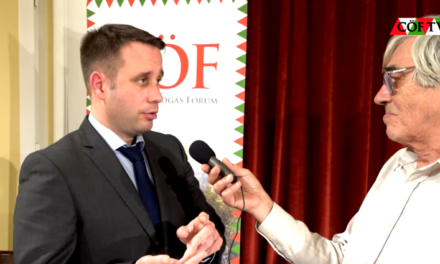How can a condominium function? Depending on its residents and its common representative, it can be very messy or just pleasant and familiar. Where the common representative takes care of the building, where the residents protect and beautify their surroundings, life must be great. Where they bite each other and their representative steals the shared funds entrusted to him, on the other hand, it is horrible. Exactly like in the big apartment building, that is, in the country.
The only difference is in the name. The joint representative of the latter, i.e. the country, holds the title of prime minister, and the name of the joint cost is this: tax. Simple, isn't it? If the common representative is conscientious and uses the paid common expenses wisely, life in the large apartment building is pleasant, if not, it is hell.
Once upon a time, where was it? It was in a dilapidated apartment building called Magyarország. There, where the residents satisfied the arbitrariness of the janitor (that's how the common representative was called at the time), the neglect of the building, the forints collected at all kinds of addresses, but then sliding down the janitor's funnel, exchanged for halves. And that he also disappeared the elevator money, even though there was no elevator in the house, only elevator money. They were fed up with the fact that the garden belonging to the house was overrun by weeds, while they also paid the gardener, who was, of course, nothing more than the janitor's drinking buddy. The residents put up with it for a long time, while they enviously peered over to the neighboring building, the house called Austria, which seemed like Eden to them...
But patience is also finite and when their butts were already visible from their pants, they stopped playing. They were afraid of the janitor's revenge - they had already experienced what happens to the rebels - but they realized that he didn't have enough friends to keep his service apartment and rule over the residents.
The new joint representative - as they were called at that time - inherited a pile of ruins, an empty coffers and the janitor's squirming war of comatose, and the community divided into two camps. The opposing side fired at the new leader because they wanted their own man to replace him.
The new leader was supposed to do a miracle, and he did, but the residents didn't feel it right away. However, in the House of Hungary, patience ran out a long time ago. The moment representative Antall got to work, they were already shaking their fists at him and pointing towards the House of Austria. Why theirs didn't become like that right away. The disaffected eventually joined forces with the supporters of the former janitor and voted them back.
Hey, I became a Danish-Danish, they were expecting HUF 3 and 60 fils per kilo of bread again, but somehow it didn't want to happen. On the other hand, the Pannon cougar came, racing towards victory like the Etian snail, there was a competent accountant there, who put together great little packages, because Bokros still had time for that among his tasks. They sold this, that and that, everything they could get their hands on - the house still didn't want to be fixed. In fact!
Well, if that doesn't work either, we'll vote again - they thought and voted for a young, ambitious joint representative named Orbán. Who refused to cooperate with the janitors. On the other hand, he used the collected money wisely, the apartment building was plastered again, the weeds disappeared in the garden and the flowers started to bloom...
But even now, for some, the 3.60 bread and living without work hovered in front of their eyes. In their nostalgia, they replaced the joint representative again, because the opposing candidate promised them even more. Although they could have been suspicious when, shortly after the election, the one named Gyurcsány, who once acted as deputy mayor, outed the elected and elected himself. The residents received nice promises, many hundreds of steps, and the continuous increase of common costs.
In return, they got nothing but pipe breaks, gas price increases, the withdrawal of benefits for the needy, and of course more and more joint cost increases. They sold the house's garages, basement and attic, and were already considering selling the stairwell (from then on the residents would have to pay to be able to return home). The electricity was almost turned off, the heating was turned off, because the huge joint costs somehow did not run enough to pay the bills.
The glass is full. They remembered what a great job a joint representative named Orbán had done, so they called him back. Now they weren't expecting a miracle, at least not right away.
However, patience pays off, so the building slowly became beautiful again, there were no problems with paying for electricity, gas, and heating, even though the common costs were constantly reduced. They blinked less and less often towards the neighboring Austria house and more and more people hoped that soon their house would tick off their neighbor's.
But everything is in vain if the confused figure named Gyurcsány has sneaked back and has been poisoning the souls of the residents ever since. Whatever common representative Orbán does, he always has a bad word for it and there are always people who listen to him. Because their apartment is smaller than the other's, their pool is shallower than their neighbor's. In addition, the fallen leader sends his wife to the apartment buildings further away, where the real Hungary house is no longer visible. From there, he is trying to organize to send People's Inspectors to the Hungarian House's residents, because his social sensibility is huge and his tiny soul cannot bear the misery allegedly caused by the dictatorship of Orbán's joint representative.
This is where our apartment building is today. They want to move the janitor back to the former service apartment, and make no mistake, if this were to succeed, they would be able to collect the elevator money again.
Although the elevator is not finished yet.
Author: Jr. György Tóth
(Cover image: National Heritage Institute )












